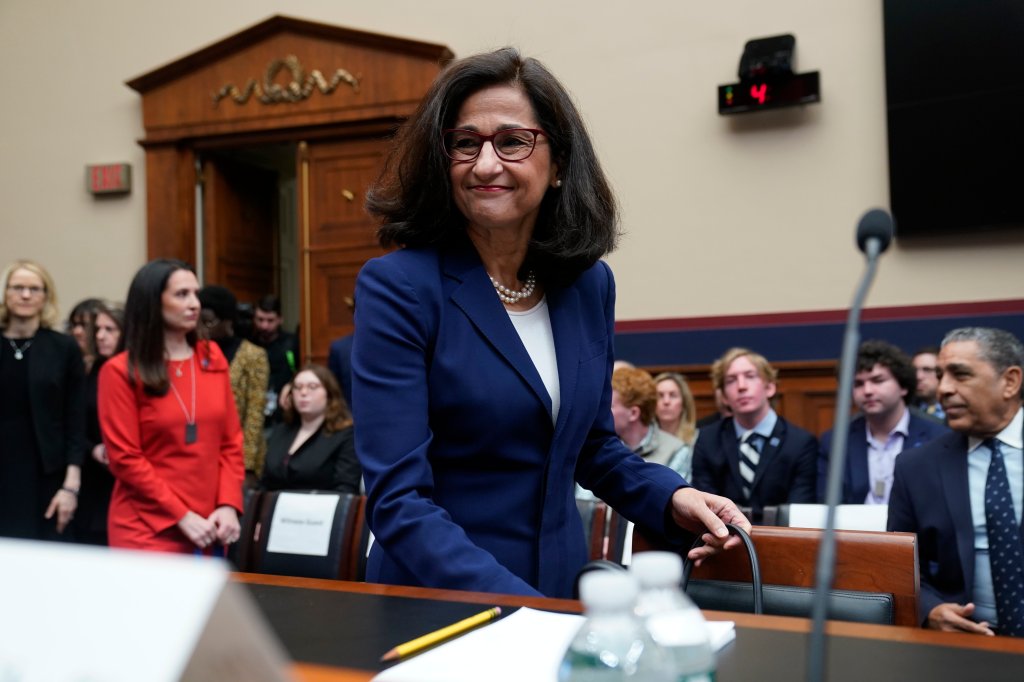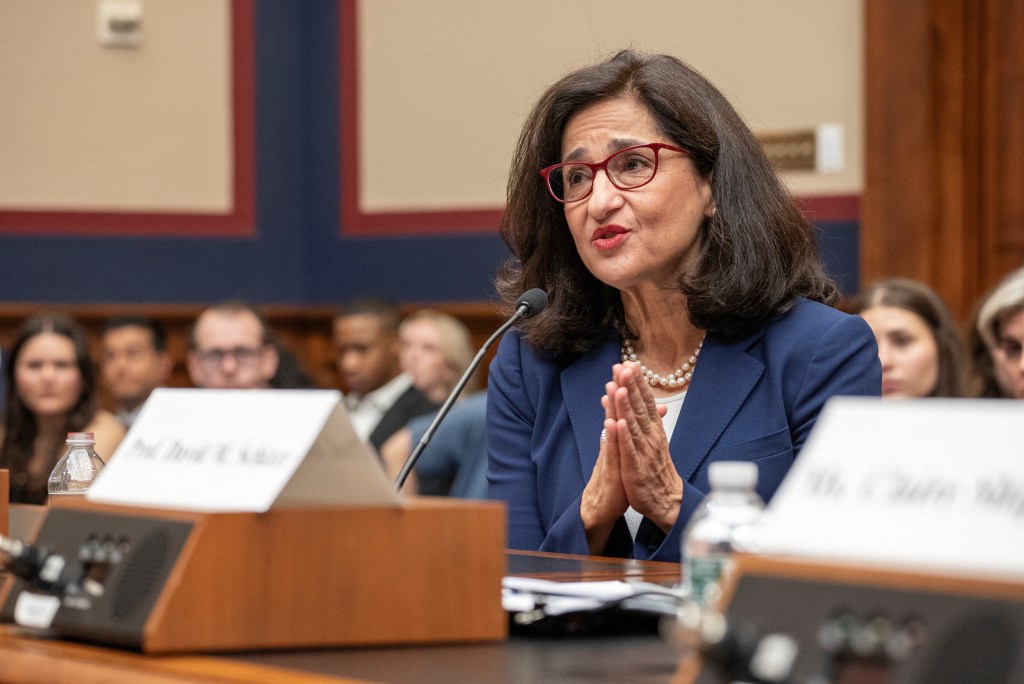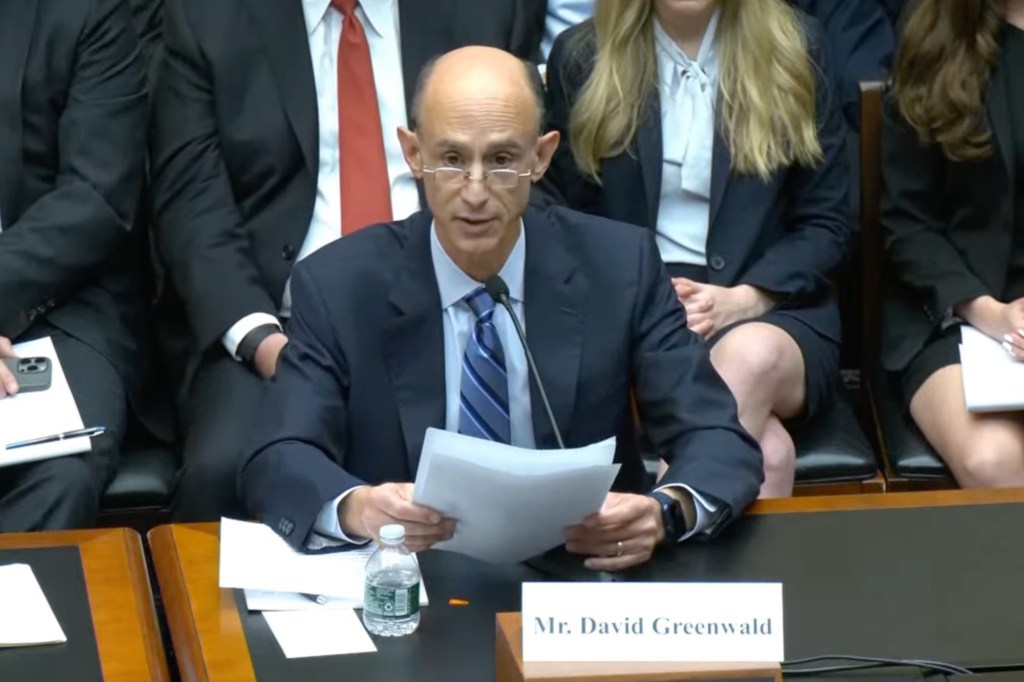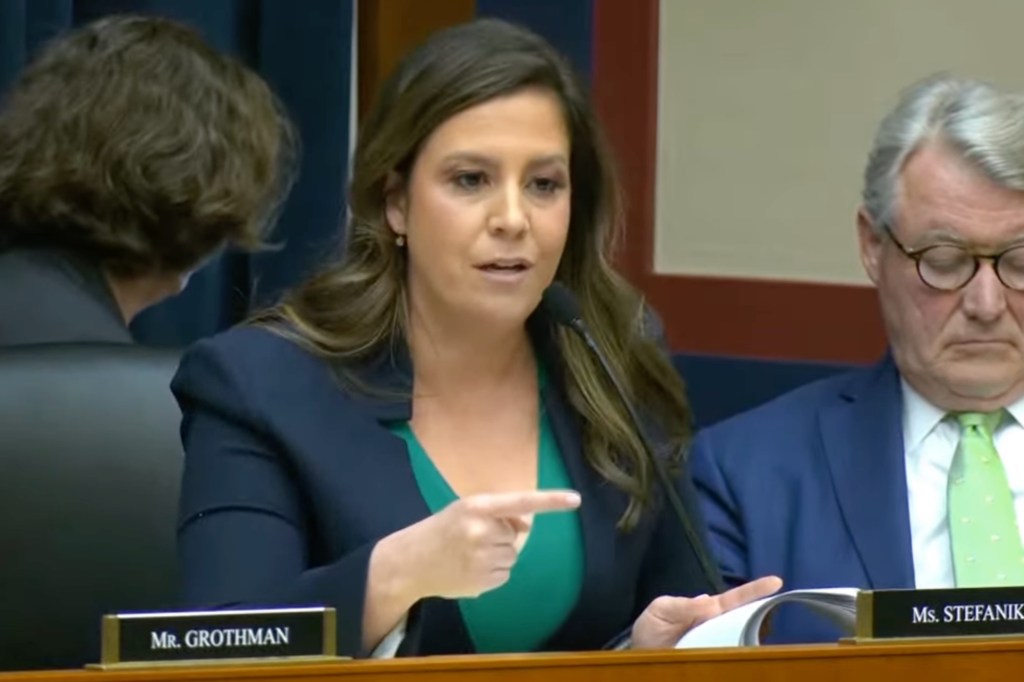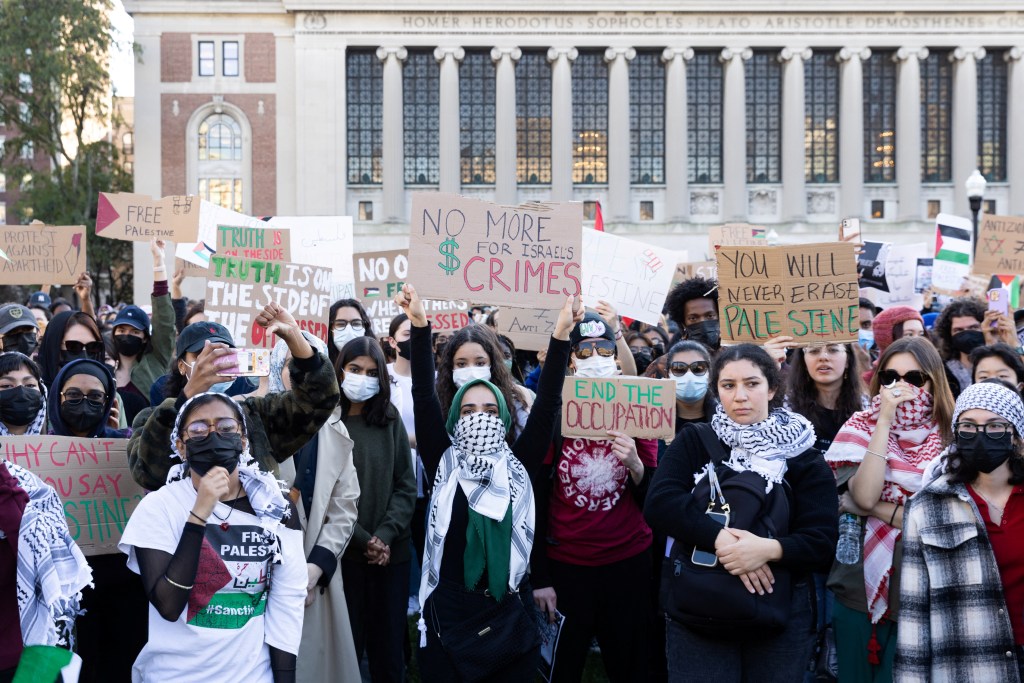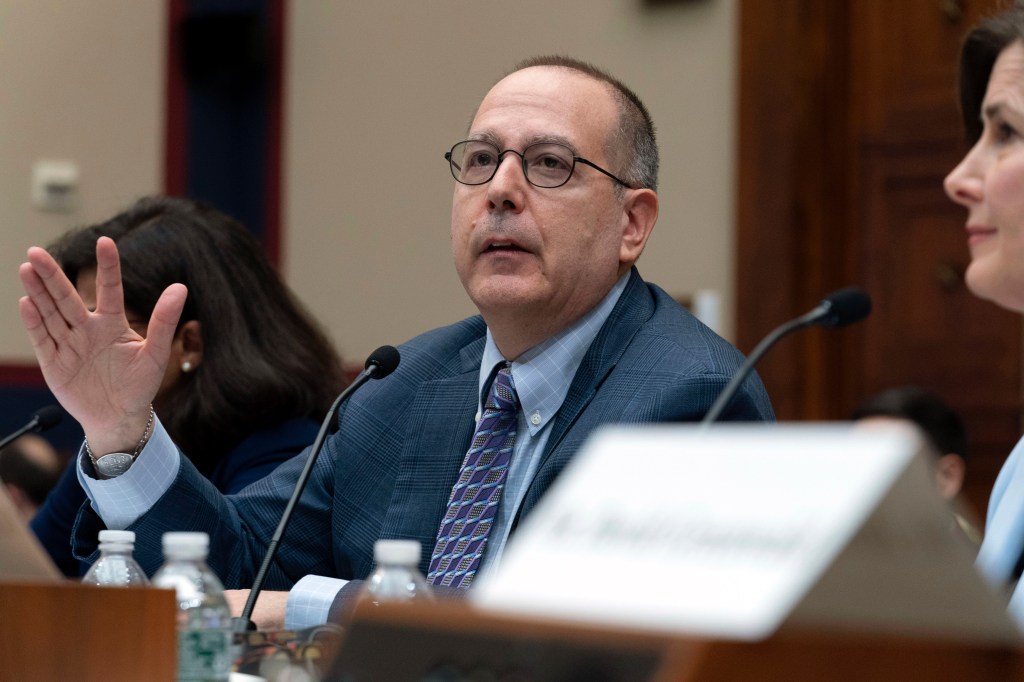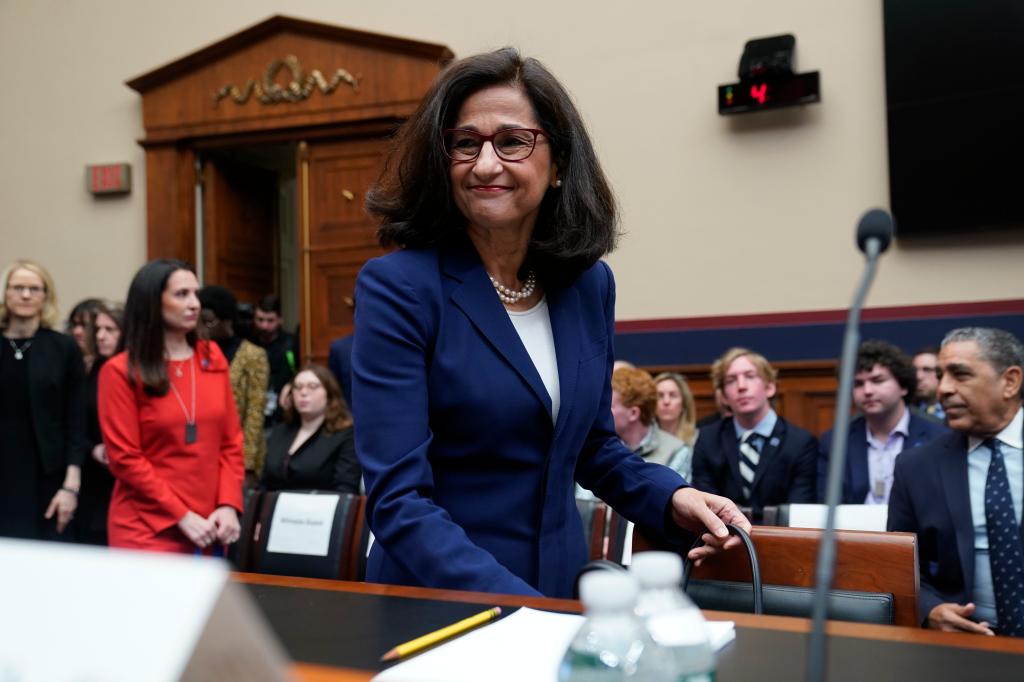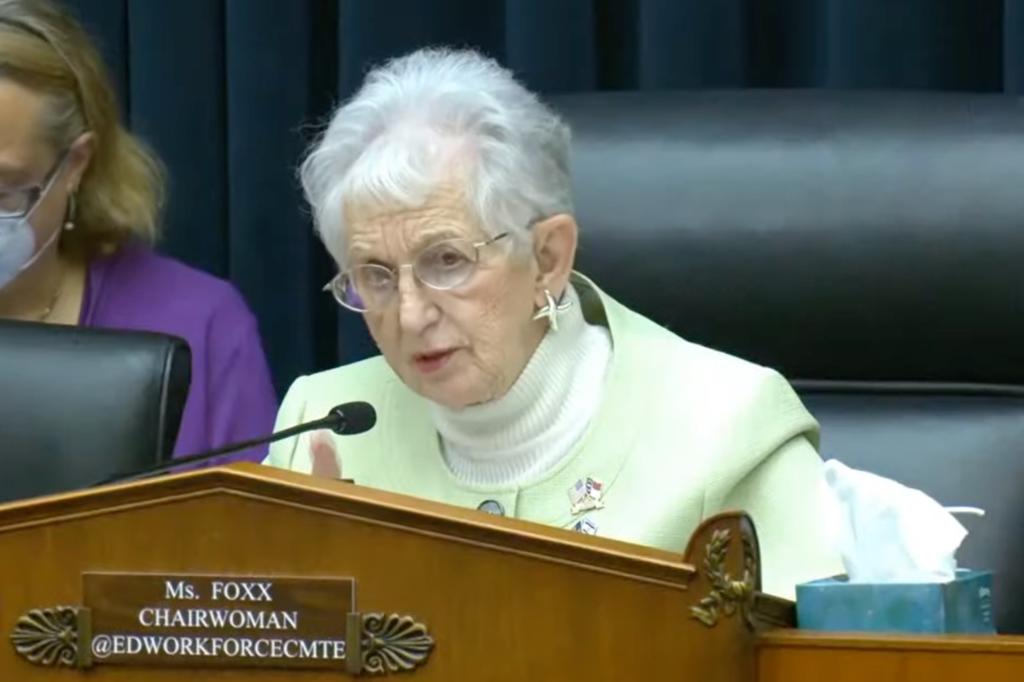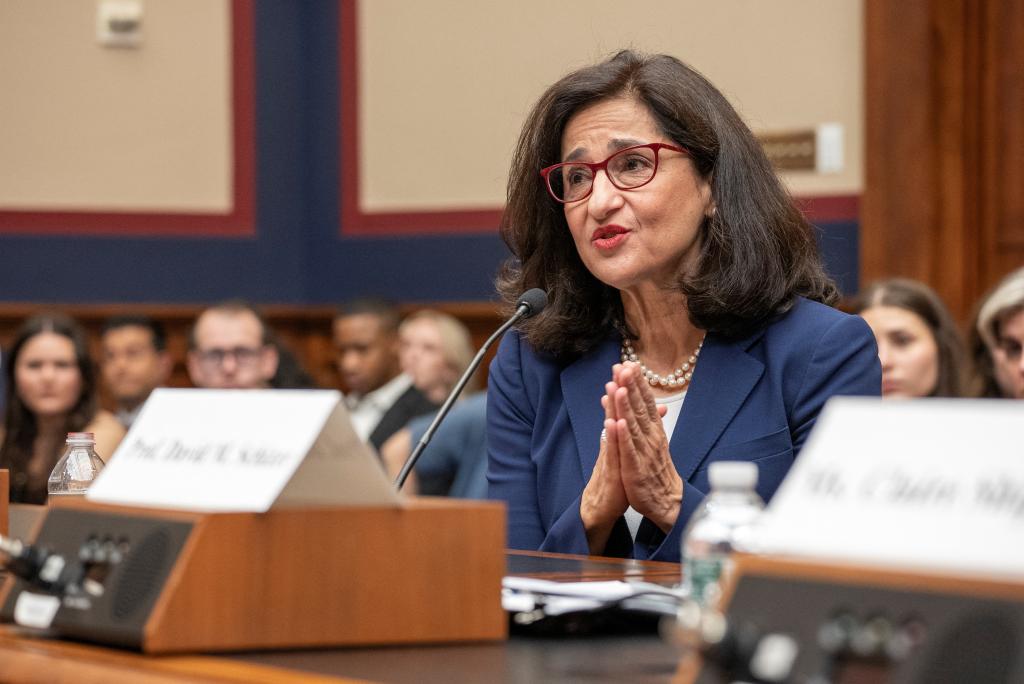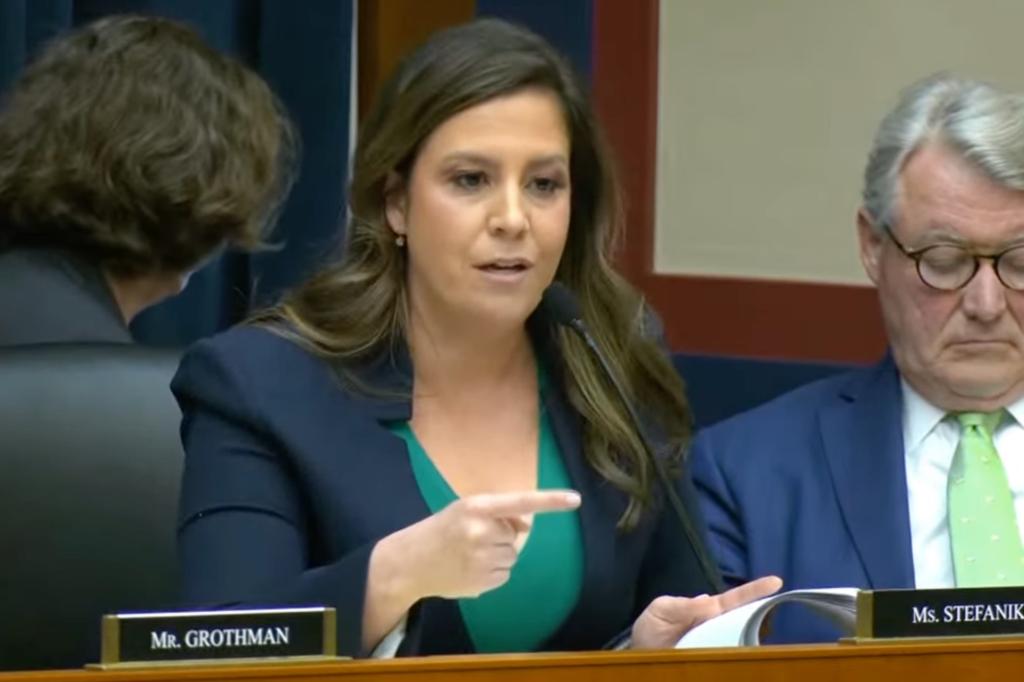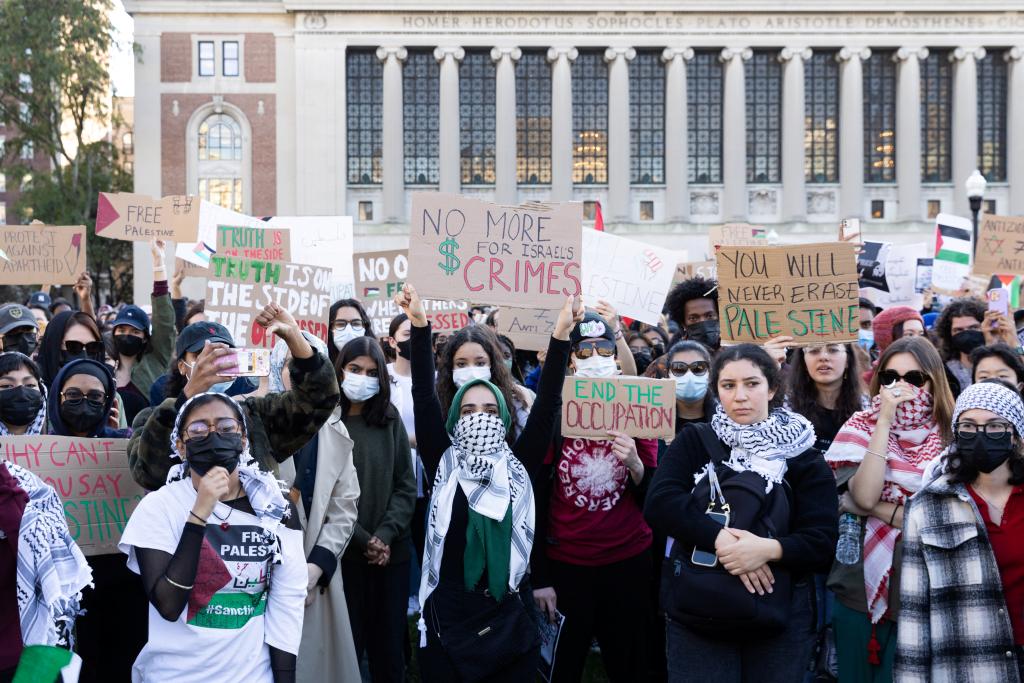Columbia University prez won’t say if ‘hurtful’ slogan ‘from the river to the sea’ is antisemitic
Columbia University president Minouche Shafik refused to tell lawmakers Wednesday whether “from the river to the sea, Palestine will be free” counts as an antisemitic phrase — instead only calling it “hurtful” and adding that she would “prefer” not to hear it around the Ivy League campus.
Shafik — appearing alongside Columbia Law dean emeritus David Schizer and two members of the Morningside Heights university’s board of trustees, Claire Shipman and David Greenwald — faced an onslaught of questions from members of the House Education and Workforce Committee about her handling of anti-Jew demonstrations and violence since the Hamas terror group’s Oct. 7 attack against Israel.
The president defended her work by citing a letter sent to students outlining appropriate language to use as well as the creation of specific places for protests to take place in order to to protect students from having to hear the “chants.”
But across several heated back-and-forths, Shafik refused to say whether the phrase “from the river to the sea” was actually allowed under school policy, saying that it is a “difficult issue.”
“Some of those expressions that you have said — ‘River to the sea,’ ‘Intifada’ — are incredibly hurtful,” said Shafik at one point, without clarifying whether those statements violated Columbia’s code of conduct.
“Professor Schizer, head of the antisemitism task force at Columbia, gave a very clear answer: ‘Yes,’” Rep. Kevin Kiley (R-Calif.) told Shafik during his line of questioning. “You, on the other hand, hemmed and hawed and then eventually said, ‘I hear them as such, some people don’t.’”
“I’m glad that Professor Schizer was able to give us a very clear answer, ‘Yes,’ but you weren’t able to do so,” Kiley added. “And I think if I were to go through another number of racial slurs and ask you if those are offensive, if those are racist, I don’t think you’d say, ‘I hear them as such, some people don’t,’ would you?”
“I’m happy to give you my personal opinion, but I think the question that you’re really asking me is: Are they forbidden to be said at Columbia?” Shafik said, sidestepping the question.
“That’s not what I’m asking actually. I’m wondering, who are you worried about offending? That’s my question,” Kiley pressed, prompting Shafik to double down on her evasion.
The Californian went on to probe how many hours the Columbia president had spent preparing for the hearing, pointing out that she had offered “very divergent responses as to some of the worst offending professors about how they’ve been handled.”
“Why is that? Why can’t you just give us the facts?” Kiley demanded. “Would you be willing to make just a statement right now to any members of the faculty at your university, that if they engage in antisemitic words or conduct that they should find another place to work?”
Antisemitism controversy at Columbia University: Key events
- More than 280 anti-Israel demonstrators were cuffed at Columbia and the City of New York campuses overnight in a “massive” NYPD operation.
- One hundred and nine people were nabbed at the Ivy League campus after cops responded to Columbia’s request to help oust a destructive mob that had illegally taken over the Hamilton Hall academic building late Tuesday, NYC Mayor Eric Adams and police said.
- Hizzoner blamed the on-campus chaos on insurgents who have a “history of escalating situations and trying to create chaos” instead of protesting peacefully.
- Columbia’s embattled president Minouche Shafik, who has faced mounting calls to resign for not cracking down sooner, issued a statement Wednesday saying the on-campus violence had “pushed the university to the brink.”
- Columbia University president Minouche Shafik was accused of “gross negligence” while testifying before Congress. Shafik refused to say if the phrase “From the river to the sea, Palestine will be free” is antisemitic.
- More than 100 Columbia professors signed a letter defending students who support the “military action” by Hamas.
“Any faculty member at Columbia who behaves in an antisemitic way or in any discriminatory way should find somewhere else to go,” Shafik repeated.
Committee Chairwoman Virginia Foxx accused Shafik of “gross negligence” at the top of Wednesday’s hearing, calling attention to the environment on campus following the Oct. 7 assault, which killed an estimated 1,200 people — including 33 Americans.
“Columbia stands guilty of gross negligence at best — and at worst has become a platform for those supporting terrorism and violence against the Jewish people,” said Foxx (R-NC).
“That a taxpayer-funded institution became a forum for the promotion of terrorism raises serious questions,” she added. “I need not remind you that this is not just a moral duty, but a legal duty set forth in Title VI of the Civil Rights Act of 1964.”
Shafik agreed that “the events of October 7 brought to the fore an undercurrent of antisemitism” but maintained that Columbia had taken “immediate action” in the wake of the deadliest day for the Jewish people since the Holocaust.
“I attended a vigil for the victims on October 9; we held daily meetings of our campus security committee; we brought in extra security expertise; and have regular contact with NYPD and the FBI,” Shafik told panel members.
She acknowledged that “trying to reconcile the free speech rights of those who wanted to protest and the rights of Jewish students to be in an environment free of discrimination and harassment has been the central challenge on our campus.”
That challenge became clear at the start of the hearing, as self-described “anti-Zionist” Columbia students shouted to be let into the hearing room — and Republican lawmakers grilled the panel about the university’s fostering of antisemitic faculty and permissive approach to violations of its code of conduct.
The presidents of Harvard University, MIT and the University of Pennsylvania shocked panel members in December when pressed by House GOP conference chairwoman Elise Stefanik (R-NY) on whether calls for the genocide of Jews violated their schools’ codes of conduct.
Harvard’s Claudine Gay, MIT’s Sally Kornbluth, and UPenn’s Liz Magill all said the statements would depend on “context.”
Gay and Magill have since resigned from their posts following the latter’s dismal performance before Congress and the former facing pressure from her testimony and a subsequent plagiarism probe.
Get all the stories that move New York to your inbox
Sign up for our Metro Daily newsletter!
Thanks for signing up!
By contrast, all of Wednesday’s witnesses affirmed that such calls would violate Columbia’s code of conduct.
But when asked by Rep. Kathy Manning (D-NC) whether calls to “’globalize the intifada’ were acceptable at Columbia,” Shafik demurred.
“I personally find it unacceptable,” the president said. “Our current rules have not specified that as not acceptable.”
Rep. Tim Walberg (R-Mich.) also confronted Shafik over professor Joseph Massad, who referred to Hamas’ attack on Israel as “awesome.”
Shafik said Massad had been “spoken to” since then and told that his language was “unacceptable” — but none of the witnesses would say whether he is still being allowed to teach courses.
Stefanik called for the dismissal of Massad as chair of an academic review committee at the university — revealing that past claims he had already been removed from that post were contradicted by the school’s own website.
Greenwald agreed that Massad’s comments were “abhorrent” and “one of the steps that we could take in terms of discipline is to remove him from that leadership position.”
“Will you make the commitment to remove him as chair?” Stefanik demanded of Shafik.
“I think that would be – I think I would, yes. Let me come back with yes,” she said. “But I think I just want to confirm his current status before I reply.”
“We’ll take that as a yes,” Stefanik said, “that you will confirm that he will no longer be chair.”
The witnesses also gave few details about the hiring process for Mohamed Abdou, a visiting professor in the Modern Arab Studies department who espoused support for Hamas, Hezbollah and Islamic Jihad just days after Oct. 7 — and was later terminated.
“He will never work at Columbia again,” Shafik said of Abdou.
“Today’s hearing of Columbia University president and board members epitomizes the failed leadership on ‘elite’ college campuses to combat antisemitism and protect Jewish students,” Stefanik declared in a statement after the hearing, “from the university president’s moral equivocation on antisemitism, to glaringly inconsistent testimony regarding disciplinary action and lack thereof taken against antisemitic students and pro-terrorist faculty, to astonishingly stating that there has been no ‘anti-Jewish’ protests on campus only to then acknowledge that ‘F– the Jews’ & ‘Death to the Jews’ is in-fact anti-Jewish when she was further pressed.”
“Interestingly, during a break, the witnesses were overheard discussing how well they thought their testimony was going for Columbia. This arrogance is eerily reminiscent to the previous three university presidents who believed walking out of the hearing that their testimony was acceptable. Columbia is in for a reckoning of accountability,” Stefanik added.
“If it takes a member of Congress to force a university president to fire a pro-terrorist, antisemitic faculty chair, then Columbia University leadership is failing Jewish students and its academic mission. No amount of overlawyered, overprepped, and over-consulted testimony is going to cover up for failure to act.”
In a press conference before the hearing, student Eden Yadegar declared that “the Jewish community at Columbia is alone.”
Yadegar recounted incidents of Jewish students having Star of David necklaces ripped off their bodies and hearing shouts of “F–k the Jews” in kosher sections of the dining halls on campus.
“They have failed their Jewish students,” she said of university administrators, pointing particularly to demonstrations that have praised even designated foreign terrorist groups like Hamas, Hezbollah and Islamic Jihad.
“Freedom of speech does not include freedom to harass,” Yadegar said. “It is a fundamental attack on Columbia’s values and America’s values.”
“Contrary to the depiction we have seen on social media,” Shafik had said in a Wall Street Journal op-ed before the hearing, “most of the people protesting do so from a place of genuine political disagreement, not from personal hatred or bias or support for terrorism.”
The hearing began hours after Columbia students launched a “Gaza Solidarity Encampment” on the lawn in the main square of campus.
Dozens of tents were erected, with about 100 students calling for the university to immediately divest from Israel.








